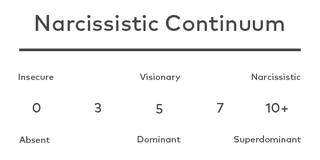Narcissism
Remembering Jodi Arias: Poster Girl for Narcissism
What Jodi Arias teaches us about narcissists.
Posted February 23, 2017 Reviewed by Ekua Hagan
The word “narcissist” is in the headlines a lot these days. Armchair psychiatrists (and even real ones) have pushed the ethical envelope to the breaking point, offering up long-distance diagnoses of Narcissistic Personality Disorder (NPD) for President Trump, while self-help blogs, books, and articles seeking to explain narcissism abound.
Watching all this from my perspective as a psychiatrist, I’m both heartened, and concerned at the same time. First, this is good news because it means more Americans are becoming aware of personality disorders, which means more might seek help or avoid unhealthy relationships.
I always tell people they can’t change someone else, and in the case of those with diagnosable personality disorders, the advice goes double. NPD, in particular, is very difficult to treat because those who have it think they’re better, smarter and more in control than everyone else. They’re unlikely to ever seek or agree to treatment in the first place, and if they do, they might use the opportunity to manipulate one more person into validating the high opinion they have of who they are.
In other words, recognizing the telltale signs of NPD in others could save healthy people a lot of time and heartache. These are not folks with whom you can have a healthy, happy and long-lasting relationship because the true narcissist has no empathy, and doesn’t give a damn about you.
However, having said all that, I’m concerned because there is a big difference between NPD and being narcissistic, which all of us are to varying degrees, at different times or in different areas of our lives. For example, many of the world’s most obviously “successful” people, such as actors, athletes, musicians, and politicians, display narcissistic traits.
So with this article, I hope to differentiate between the disorder and the traits, because I think we are increasingly at risk of overusing the word “narcissist,” and this serious diagnosis should never be just a slur for people who’ve hurt us, or who we don’t like.
The Ultimate Narcissist: Jodi Arias
One of the easiest ways to illustrate the difference is to compare and contrast a person who displays most of the traits of NPD, with the behaviors of those who are just “narcissistic.” The person who immediately comes to mind is also the one who probably did the most to introduce the word “narcissism” to the American vernacular: Jodi Arias.
Full disclosure: I have not evaluated Jodi and all of the discussion below about her state of mind is pure speculation based on information obtained from media reports.
Jodi Arias was convicted in 2013 of murdering her boyfriend, 30-year-old Travis Alexander, in 2008. During the trial, she tried to argue that Alexander had abused her, and she acted in self-defense. The jury didn’t buy it, and they convicted her of murder in the first degree. At no time prior to the conviction did we see even a shred of remorse.
Then, craving the spotlight, she demanded to represent herself for the sentencing phase. The judge said no, and ordered the trial attorneys to handle it. I suspect she knew this would happen, but wanted the media buzz the controversy would generate.
A skilled manipulator, she still managed to connect with the jury well enough to avoid the death penalty. As a result, the judge had no choice and handed down a life sentence, without the possibility of parole.
If Jodi Arias's lack of remorse in the courtroom didn’t scream narcissist, her behavior in prison certainly does. To date, Jodi has still not expressed any remorse or regret for killing Travis. Instead, she spends time selling her drawings online, video calling fans, and chatting by phone with others. In one call, rapper Kareem “Lefty” Williams says he’s gotten a lot of hate mail since the release of his latest video, and said that he and Arias are probably the “most hated” people in America. After a brief chat about yummy fajitas for dinner, Arias responds by saying:
“It’s all good…If this is what it’s like to be hated, keep hating. I have so much love coming in my direction, I can’t respond to it all.”
Think about that for a second. She is embracing the love and hate she got for committing murder! It’s not about the crime rather the attention the crime generated.
Arias also enjoys taking video calls from fans as young as 15, telling them to get fake IDs so they won’t get caught, because prison rules dictate callers must be 18 or older. The prison rules state that anyone can call, and though Jodi has the option to refuse, she always accepts. Apparently she would rather spend as many as 9 hours a day talking to people she’s never met than do anything else.
Again, keep in mind this is a woman who doesn’t deny killing Travis, the man she claimed to love. She just maintains she did it in self-defense. Is this how you would expect someone to act when serving a life sentence for a crime they claim they didn’t mean to commit? Talking up the food in prison, and bragging about fan mail? She seems to be enjoying her status as one of America’s “most hated,” and that’s exactly how a narcissist would think; that any attention is good attention, even if you have to spend your life in prison to get it.
Based on my observations, Jodi Arias displays seven of the nine DSM criteria for NPD. She doesn’t just want or like attention, she craves it, and needs it, often more than life itself. Narcissists are abusive and manipulative of others, and completely absorbed with themselves. They are willing to victimize anyone to achieve their own ends, and show no remorse when they get caught. On the contrary, they often enjoy the notoriety that comes along with that.
People with NPD also have no problem lying, manipulating, and ignoring rules altogether, thinking these rules do not apply to them because after all, they are smarter, better, and more deserving than other people. The key here is “than other people.” How they see themselves in relation to others, determines whether they are really narcissists, or just displaying narcissistic traits. That's because narcissists who fit most or all of the DSM criteria have the capacity to intentionally victimize and exploit others. Quite simply, those in their life either serve a need or get in their way. There is no in-between.
That sounds like Jodi, right? She victimized Travis, in the most brutal way possible, and why? Because he was trying to break up, and by god, if she couldn’t have him then nobody else would either.
He was her property, not a separate individual, and, to her way of thinking, his refusal to play by her rules justified his death. She lied about the motives, not just because she's sane, and understands “right” vs "wrong" by social and legal standards, but also because being a victim was yet another attempt at manipulating those around her.
Even now, after being locked up for life, Jodi loves being infamous. I would love to ask her one question: “Was it worth it?” I would not be surprised if her answer was a resounding, “YES”!
Not All Narcissism Is Pathological
The problem with overusing the word “narcissism” is that it becomes too easy to think that every obviously self-focused person who shares some, or even several, of the traits Jodi displayed, is capable of abuse, or even murder, and that it's only a matter of time. That's just not true.
Even Jodi didn’t kill Travis strictly because she was narcissistic. She also had many of the traits associated with anti-social personality disorder, (better known as a “sociopath," though anti-social personality disorder is the correct diagnostic term). Specifically, as I wrote at the time, Jodi displayed the following:
Failure to conform to societal norms: Jodi has no respect for the law or the rules of society. She not only viciously killed another person, she openly and unabashedly sneered at the prosecuting attorney during the courtroom proceedings.
Pathological lying: Arias has no problem lying. We've all seen it and know she's good at it. Sociopaths lie easily and keep their cool because a lie is not considered wrong or immoral. It's merely a way to get what they want.
Manipulation, deception, and cunning: Arias hacked into Alexander's email and Facebook accounts. He found her hiding in his closet when he returned home from a date. She introduced him to sex, playing the submissive partner, though she was actually dominant, in order to control him. It is the prosecution's speculation Arias eventually filmed and recorded Alexander in compromising situations to blackmail him if he tried to leave.
Impulsiveness: A co-worker claimed Arias continuously called Alexander from work. If there was no answer, she would drop everything and leave to track down Alexander. She didn't care if she lost her job, as long as she didn't lose Alexander.
Irritability and aggressiveness: Arias became increasingly irritable, and when Alexander started seeing another woman, she turned up the heat. She stalked, vandalized, plotted and then murdered. Twice she slashed the tires on his car. She also sent a threatening email to Alexander's new love interest.
Lack of remorse or guilt: In Arias' mind, Alexander was not a person but a possession. He took her to interesting places, and she introduced him to sex. When he tried to pull away, she would reel him back with ever more outrageous sex practices. Eventually she killed him so no one else could have her possession. At the funeral, she did not shed one tear. Since the murder, the investigation, the arrest and the trial, not once has she said "I'm sorry."
Just as Jodi Arias does not display all of the DSM characteristics of NPD, she is also missing the key criterion that would identify her as a sociopath: a history of these behaviors prior to age 15. There is no evidence she had these traits prior to her relationship with Travis Alexander. Nevertheless, it's the combination of the narcissistic traits and the anti-social traits that made her a ticking time-bomb.
The DSM Has Its Limitations: Not Everyone With Narcissistic Traits Is Like Jodi Arias
The story of Jodi Arias also illustrates the limitations inherent to the DSM criteria. If one had several, but not all of the traits listed for narcissism, we couldn’t diagnose them with NPD, and technically they are not a “narcissist,” but that wouldn’t help us understand why — for example — they are so much more confident than their peers, or have trouble feeling empathy for others.

That’s why I developed the Continuum Model for Self-Focus. Instead of an all-or-nothing approach to narcissistic traits, this model allows us to evaluate people who are nowhere near as extreme as Jodi Arias, but still impress us as more self-focused than “average.”
There are self-focused individuals who think they are special, crave attention, and thrive under pressure who are capable of tempering their grandiose sense of self-worth with an ability to relate in a positive way with those around them. They can balance their self-focus and tendency towards inward thinking with at least a touch of empathy and concern for others. I call this high functioning or healthy narcissism.
Healthy narcissism is a belief in yourself, in who you are, and in what you are able to accomplish. It’s the ability to bounce back after failure, and to courageously face big challenges that others might avoid.
Healthy narcissists are people we know and admire, like famous athletes, and entertainers, inventors, and CEOs. These are those who had to have high self-esteem, resilience, and courage in the face of rejection, adversity, and failure in order to get where they are. They are hard for those that are less self-focused to relate to, because they seem aloof, or distant, or wrapped up in themselves, but they still aren’t pathological.
The reason it's so important to go back and look at someone like Jodi Arias now, despite the fact that she’s disappeared from the daily headlines (where I'm sure she'd still like to be), is that she serves as a reminder of what someone with pathological NPD looks and sounds like. Safe to say, we wouldn't look at today's politicians, and equate them to Jodi Arias, right? We might be able to identify some traits they share, like a grandiose sense of self-importance, or a sense of entitlement, and we might even observe arrogance and a need for excessive admiration, but it would be a huge stretch to mention (for example) President Trump, and Jodi Arias, in the same sentence.
So the next time you read or hear someone using the word “narcissist" to describe someone, remember Jodi Arias. Ironically, what makes her such a good benchmark to use for pathological narcissism, is the very fact that — despite being locked away for life — she’d like the fact that you’re thinking about her.




